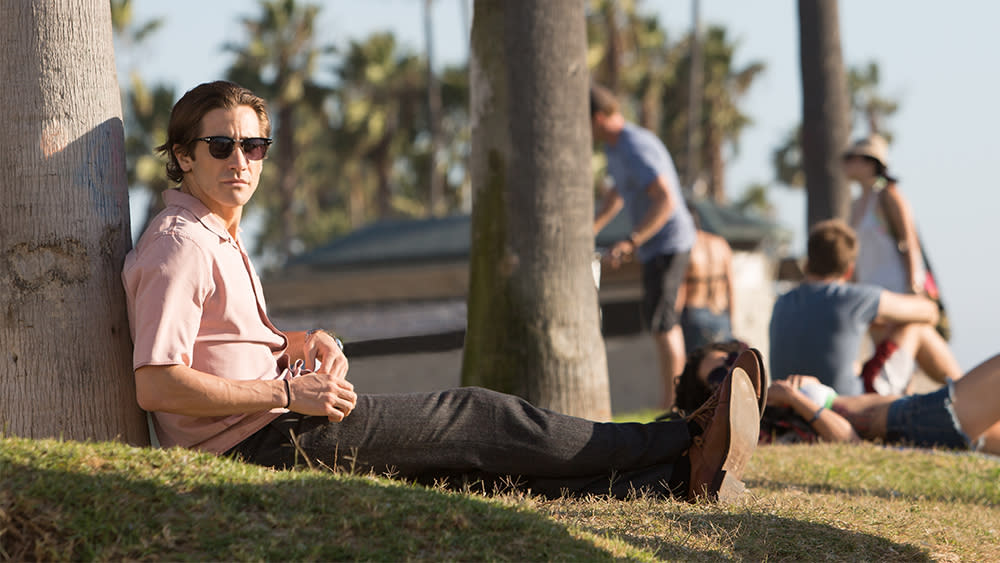Oscar Original Screenplay Nominees: Clear-Eyed Chroniclers of Decline and Fall

This year, the original screenplay category scorches.
“Birdman,” “Foxcatcher,” “The Grand Budapest Hotel” and dark horse “Nightcrawler” share a focus on people or societies on the brink of doom.
See Also: Oscar Adapted Screenplay Nominees: Searching for Truth, Line by Line
“Birdman” follows an actor trying to reclaim his shattered family and career. In “Foxcatcher,” America is presented as a dark landscape where the mad rich and the struggling poor are interdependent, but their relationship can end in murder.
“The Grand Budapest Hotel” catches Europe just before war shatters what’s left of its genteel society. And “Nightcrawler’s” antihero sees the darkest underbelly of Los Angeles — only to shoot it and sell the tape.
“In Western society, we have bought into the notion that until you get money and power and fame, that’s when you get happiness,” says “Birdman’s” writer-director, Alejandro G. Inarritu. “What I tried to say is that we are running for the wrong things and when we get them we are not happy.”
“Nightcrawler” writer-director Dan Gilroy created Louis Bloom (Jake Gyllenhaal), a bottom-feeder that thrives on the razor’s edge in a time of vast income inequality. (pictured above)
Gilroy says, “The script’s thematic darkness reflects my feelings when I wrote it. … Economically we’re entering a hyper-capitalist state, and that’s sort of the jungle. The strong thrive, the weak don’t. Somebody like Lou, who leaves his humanity at the door and goes off in an acquisition mode unfettered by human emotion will not only succeed but be rewarded.”
Dan Futterman, who co-wrote “Foxcatcher” with E. Max Frye, understands how audiences can read the larger economic crisis into his film and, yet, the individual story is what compelled him.
“I’m aware of the financial background, the way the economy has created a divide between rich and poor,” says Futterman. “And, yes, you see the using of the poor and talented by the rich for their self-aggrandizement. That’s very much in the air now.”
However, “that felt interesting but not inspiring to me,” says Futterman, for whom the tension in the foreground was the driving force: “I feel drawn if there’s a complex personal story where people are putting themselves in a position that’s bound to end tragically.”
“It’s not so different from ‘Capote,’ (also written by Futterman and directed by Bennett Miller) “in terms of a script that has at the beginning the Greek tragedy where you see the seeds of their destruction and they can’t help hurtle toward their fate. I’m interested in those stories, more timeless than of a particular time.”
While every original script reflects its author, Inarritu sees his own creative journey intersecting that of his protagonist on the verge of a mental meltdown and a creative breakthrough.
“The disparity between Riggan’s ambition and what he’s capable of: That’s the tension,” says Inarritu.
“When Riggan loses his pants and he’s in the theater without a gun, in his underwear, that for me is the formidable actor: he’s giving himself, exposed, with braveness and he’s also lying, with courage and pretensions. Everybody’s ambitions are in disparity with our capacity. I was struggling with the same discrepancy as I was making this film.
“ ‘Birdman’ was a mirror in a mirror and an infinite projection of my fears. I exorcised my demons because my process making a comedy in one single take with a drum score was as terrifying as the journey Riggan Thomson was about to start.”
Related stories
Oscar Nominees Blur Lines Between Big and Small Screens
'Whiplash' Screenplay: That Touch of Horror Made Chizelle's Script Sing
'Boyhood' Screenplay: Linklater's Subtle Exploration of Mortality
Get more from Variety and Variety411: Follow us on Twitter, Facebook, Newsletter
